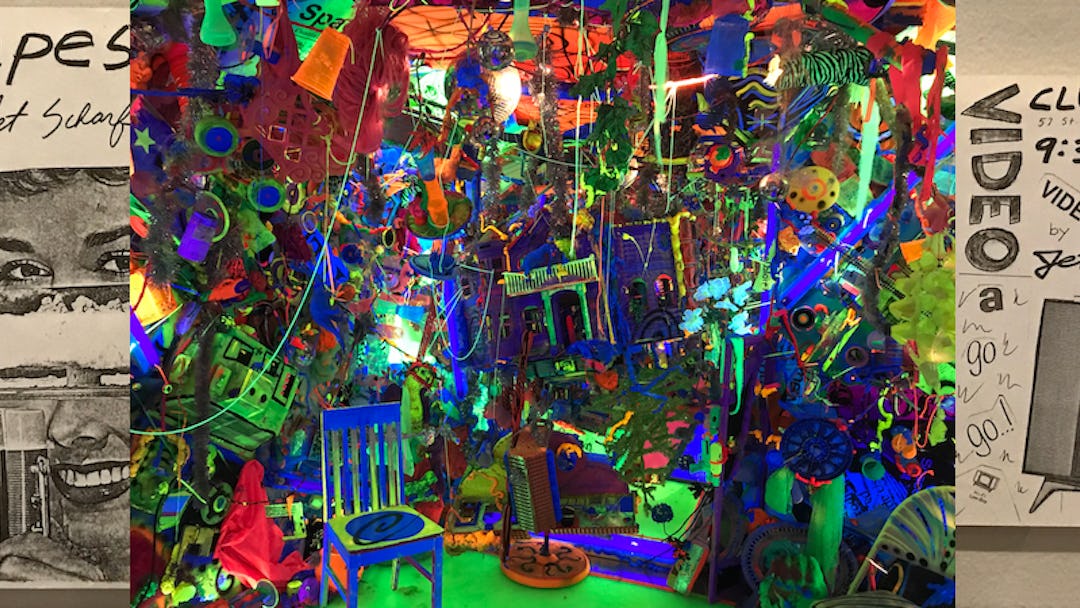Though your Flavorwire is headquartered in New York City, we try not to make our coverage all that city-specific; we don’t want to alienate the rest of our readers, y’know, FOMO and all that. And yet it somehow feels acceptable to share some thoughts on “Club 57: Film, Performance, and Art in the East Village, 1978-1983,” a terrific new exhibit at the Museum of Modern Art, because (for this museum-goer, anyway), so much of the exhibit is about missing out – about conjuring up a time, both for the culture and the city, that is long gone, and altogether irreplaceable.
Club 57, if you hadn’t heard (guilty) was a DIY venue in the basement of the Holy Cross Polish National Church, located at 57 St. Marks Place in Manhattan. Originally intended for music and film events, is also became, over the course of its five-year existence, a space for visual art (Keith Harring was the exhibition organizer), performance art (the great Ann Magnuson, who would subsequently appear in films like Making Mr. Right and Tequila Sunrise, was the performance manager and frequent star), fashion shows, and dance. It was an anything-goes location, run by weirdos and misfits, in which anyone could show their film, sing their song, and/or share their art.
(Jason Bailey / Flavorwire)
Of course, much of this is difficult to replicate in a modern museum setting, particularly one as staid as MoMA, though they work it well. A makeshift screen and folding chairs are set up to run no-budget, “No Wave” 16mm and Super 8 short films by the regulars. TV monitors run bleary VHS tapes of club-made videos, and performance clips of Magnuson et. al. Artworks by Harring, Basquiat, and Fab 5 Freddy adorn the walls.
But what draws the eye are the flyers. “The handmade flyers and posters participants plastered around the city to promote themselves and their creative activities exemplify the do-it-yourself, pre-digital nature of the time,” explains the introductory text, and though Xeroxed handbills were around before this period and for a good long while after it, there’s something indelibly specific about the look and feel of these hand-crafted teases. (Maybe it’s just seeing Smithereens too many times.)
(Jason Bailey / Flavorwire)
Strolling through the gallery, I found myself first grinning at the scrawled text and FUTURE NOW subtext (“Videotapes!” promises one), then leaning in to peer more closely at the specifics. Here’s an event called “TELEVISION-NOSTOMANIA!,” from 7pm to 1am on a Sunday night, with this promising (typewritten!) text: “Come over to our house and watch t.v.! Vintage 60’s shows plus commercials popcorn and Swanson dinners!” And that is followed by a list of the evening’s goodies: standbys like Lost in Space, The Monkees, Car 54, and The Man From U.N.C.L.E., alongside forgotten oddities Super Car and Captain Nice. Another program, “Cartoons You Won’t See on T.V.,” promises “sex, violence, racism, and good clean fun with Gumby, Betty Boop, Space Angel, Daffy Duck, and more!!!” The most intriguing handbill is for a “REELIN’ & ROCKIN’ FILM FESTIVAL,” pairing “live bands of today” with “classic films of yesteryear” like The Big TNT Show, Keep on Rockin’, and Revolution.
Gazing upon those haphazardly designed pages, I kept entertaining the same thought, over and over again: Jesus, I wish I could’ve been there for that one. I was three years old at the time, understand, and living half a country away besides, but these programs sound like a great goddamn time. It’s not that what they’re presenting is all that hard to come by; there were plenty of “Cartoons You Won’t See on TV” tapes and discs in the years to come, and most of those have made their way onto the internet by now; ditto the old TV shows, which you can now binge by the season with the click of a mouse or the tap of an play button. Even the “rarities” aren’t rare anymore; hell, The Big TNT Show, long available only via dodgy bootlegs, got a fancy Blu-ray special edition back in 2016.
(Jason Bailey / Flavorwire)
The programming isn’t what’s irreplicable; it’s the environment. Sure, I can sit behind my laptop and watch a bunch of long-suppressed dirty cartoons on YouTube, but that’s not fun – or at least, not the same kind of fun as watching it projected on a bed sheet in an East Village basement with a bunch of giggling, drunken freaks and outcasts. I can place an Amazon order and, two nights from now, watch pristine copies of I Was a Teenage Frankenstein and I Was a Teenage Werewolf, in a home theater miles ahead of the shabby 16mm projector and tin-box sound of a venue like Club 57, but it’s not the same experience as watching it in a dark room with a bunch of half-high strangers who mostly came in to get out of the cold, and end up keying in, all together, on those movies’ weird sincerity and outsider artistry.
We hear a lot these days about the sanctity of movie theaters, and how we can’t let all the streaming giants and their collapsing theatrical windows kill that beautiful common experience, but it’s an idea typically mouth-pieced by industry insiders who haven’t been to a real movie theater – and experienced its phone-checking audiences, inflated ticket prices, and shoddy exhibition – in years. That can all go down the tubes. But the feeling of wide-eyed discovery, shared in strange spaces like college film clubs, rep societies, and places like Club 57, genuinely feels like a thing of the past. And it’s our loss.
“Club 57: Film, Performance, and Art in the East Village, 1978-1983″ runs through April 1 at the Museum of Modern Art in Manhattan.
